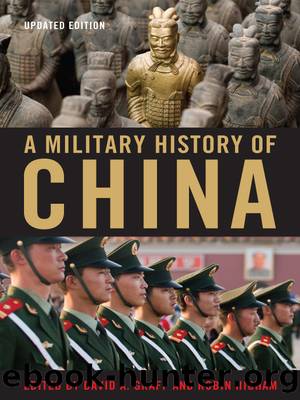A Military History of China by David A. A. Graff

Author:David A. A. Graff
Language: eng
Format: epub
Publisher: The University Press of Kentucky
THE CREATION OF THE NEW ARMIES AND THE ROAD TO REVOLUTION
The crushing defeat in the Sino-Japanese War initiated radical changes in military policy. In the aftermath of the war, with its best armed forces destroyed and its prestige in tatters, the Qing government found itself in a position of profound weakness. Long unwilling to give railway and mining concessions to foreign companies, the Qing government now found it could do little to resist foreign demands. From 1897 to 1899 a dramatic scramble for concessions saw the empire carved into putative spheres of economic influence for foreign powers. Within these spheres foreigners demanded and received rail and mining concessions, naval bases, and other benefits. In this context increasingly ambitious efforts were made to restore China's military strength, this time by building new armies from scratch.
The first of the new armies were sponsored by two officials, Yuan Shikai in north China and Zhang Zhidong in Hubei. In 1895 Zhang had established a new “Self-Strengthening Army” consisting of thirteen battalions of carefully selected men who were organized along European patterns and trained by a team of thirty-five German officers and noncommissioned officers. This force included cavalry, infantry, artillery, and engineering units, and also had medical and support personnel. Zhang also created a new military academy in Nanjing in 1896 to provide trained officers for his new army. When he was transferred back to his former position of governor-general of Hunan and Hubei, Zhang created another military academy in Wuchang and began to reform the troops in these two provinces. Meanwhile, at the behest of the increasingly influential Manchu grand councilor Ronglu, in 1895 Yuan Shikai, a former protégé of Li Hongzhang, began to establish a new army to prop up the weakened defenses of north China. This “newly created army” was to total some 7,000 men, trained by German instructors.
Defeat also spurred larger changes in the political sphere. The shortlived Hundred Days Reforms in 1898, sponsored by the Guangxu emperor, proposed radical reforms in government and education aimed at putting China on a more positive path along Meiji lines. It was, however, politically naive. A coup supported by Yuan Shikai, among others, forced the emperor into involuntary retirement and restored his great aunt, the Empress Dowager Cixi, to the regency she had held from 1861 to 1873 and then from 1874 until 1889, and the emperor was imprisoned at the Summer Palace. Cixi reversed most of the political and educational reforms, but military reforms initiated before 1898 continued. In 1900 a more severe disruption followed, the Boxer Uprising. Originating in drought-stricken areas in north China, the Society of Boxers United in Righteousness was a popular organization that practiced martial arts and other spiritual practices. Its members targeted and victimized Christian converts and to a lesser extent foreign missionaries, believing them to be the cause of their economic and social hardships. Encouraged by a number of antiforeign officials, the Boxers grew rapidly, slaughtering numerous Christians as they spread across north China. Eventually, with support
Download
This site does not store any files on its server. We only index and link to content provided by other sites. Please contact the content providers to delete copyright contents if any and email us, we'll remove relevant links or contents immediately.
Whiskies Galore by Ian Buxton(40493)
Introduction to Aircraft Design (Cambridge Aerospace Series) by John P. Fielding(32345)
Small Unmanned Fixed-wing Aircraft Design by Andrew J. Keane Andras Sobester James P. Scanlan & András Sóbester & James P. Scanlan(32145)
Craft Beer for the Homebrewer by Michael Agnew(17461)
Turbulence by E. J. Noyes(7052)
The Complete Stick Figure Physics Tutorials by Allen Sarah(6645)
Kaplan MCAT General Chemistry Review by Kaplan(6062)
The Thirst by Nesbo Jo(5791)
Bad Blood by John Carreyrou(5779)
Learning SQL by Alan Beaulieu(5420)
Weapons of Math Destruction by Cathy O'Neil(5046)
Man-made Catastrophes and Risk Information Concealment by Dmitry Chernov & Didier Sornette(4746)
iGen by Jean M. Twenge(4704)
Digital Minimalism by Cal Newport;(4565)
Life 3.0: Being Human in the Age of Artificial Intelligence by Tegmark Max(4517)
Audition by Ryu Murakami(4103)
1,001 ASVAB Practice Questions For Dummies by Powers Rod(4044)
Electronic Devices & Circuits by Jacob Millman & Christos C. Halkias(4039)
Pale Blue Dot by Carl Sagan(4015)
